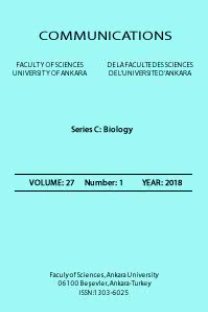INVESTIGATION OF THE ANTIMICROBIAL ACTIVITY OF Vitis vinifera L. BOĞAZKERE
Antimicrobial activity, Disc diffusion method, Vitaceae, Vitis vinifera, Boğazkere
___
Aslankoç R, Demirci D, İnan Ü, Yıldız M, Öztürk A, Çetin M, Savran EŞ and Yılmaz B (2019). The Role Of Antioxidant Enzymes İn Oxidative Stress - Superoxide Dismutase (Sod), Catalase (Cat) And Glutathione Peroxidase (Gpx). Süleyman Demirel Üniversitesi Tıp Fakültesi Dergisi 26(3): 362-369.Cheeseman KH and Slater TF (1993). An introduction to free radical biochemistry. British Medical Bulletin 49: 481-493.
Kohanski MA, Dwyer DJ and Collins JJ (2010). How antibiotics kill bacteria: from targets to networks. Nature Reviews Microbiology 8(6): 423–435.
Baydar NG, Sağdıç O, Özkan G and Çetin ES (2006). Determination of antibacterial effects and total phenolic contents of grape (Vitis vinifera L.) seed extracts. International Journal of Food Science and Technology 41: 799-804.
GTB (2015). 2014 Yılı Çekirdeksiz Kuru Üzüm Raporu, T.C. Gümrük ve Ticaret Bakanlığı Kooperatifçilik Genel Müdürlüğü, Şubat 2015. http://koop.gtb.gov.tr/data/53319ea4487c8eb1e43d72a0/2014%20Kuru%20%C3%9Cz%C3%BCm%20Raporu.pdf/. Access date: 03 .11.2015
Ateş F and Karabat S. (2016). Manisa Bağcılık Araştırma Enstitüsü Müdürlüğü, Sofralık Üzüm Yetiştirmeye Yönelik Kültürel Uygulamalar. [online]http://arastirma.tarim.gov.tr/manisabagcilik/Belgeler/genelbagcilik/Kalıtelı%20sofralık%20uzum%20yetıstırıcılıgı%20fadıme%20ates.pdf/. Access date: 11.10. 2016
Monagas M, Bartolome B and Gomez-Cordoves C (2005). Updated knowledge about the presence of phenolic compounds in wine. Critical Reviews in Food Science and Nutrition 45(2): 85-118.
Jayaprakasha G, Selvi T and Sakariah K (2003). Antibacterial and antioxidant activities of grape Vitis vinifera seed extracts. Food Research International 36(2): 117-122.
Baydar NG, Özkan G and Sağdiç O (2004). Total phenolic contents and antibacterial activities of grape (Vitis vinifera L.) extracts. Food Control 15(5): 335-339
Anastasiadi M, Chorianopoulos NG, Nychas GJE and Haroutounian S (2009). Antilisterial activities of polyphenol-rich extracts of grapes and vinification by products. Journal of Agricultural and Food Chemistry 57(2): 457-463.
Ege D (2015). Bazı Zararlı Mikroorganizmaların Kültür Ortamindaki Gelişimine Üzüm (Vitis Vinifera L.) Çekirdeği Yağinin Etkileri. Yüksek lisans tezi, Selçuk Üniversitesi Fen Bilimleri Enstitüsü, Konya.
Abtahi H, Ghazavi A and Karimi M (2011). Antimicrobial activities of ethanol extract of black grape. African Journal of Microbiology Research 5(25): 4446-4448
Waqar A, Han Aİ, Waqar M, Han MA, Han A, Ramazan R, Wali S, Ahmad F, Han N, Yousaf S, Zeb M, Han EU, Rahman MU and Faysal Ş (2014). In vitro Antibacterial Activity of Vitis vinifera Leaf Extracts Against Some Pathogenic Bacterial Strains. Advances in Biological Research 8 (2): 62-67.
Yadav D, Kumar A, Kumar P and Mishra D (2015). Antimicrobial properties of black grape (Vitis vinifera L.) peel extracts against antibiotic-resistant pathogenic bakteri and toxin producing molds. Indian Journal of Pharmacology 47(6): 663-667.
Altuner EM, Çeter T and Işlek C (2010). Cilt enfeksiyonlarının geleneksel tedavisinde kullanılan Ononis spinosa L. külünün antifungal etkisinin araştırılması. Mikrobiyoloji Bülteni 44(4): 633-639
Altuner EM, Çeter T, Bayar E, Aydın S, Arıcı F, Süleymanoğlu G, Edis A (2011). Investigation on Antimicrobial Effects of Some Moss Species Collected From Kastamonu Region, Commun. Fac. Sci. Univ. Ank. Series C 23(1-2): 33-43
Altuner EM, Çeter T, Demirkapı D, Özkay K, Hayal U, Eser G (2011) Investigation on Antimicrobial Effects of Some Lichen Species Collected From Kastamonu Region, Commun. Fac. Sci. Univ. Ank. Series C 23(1-2): 21-31
Bauer AW, Kirby WMM, Sherris JC and Turck M (1966). Antibiotic susceptibility testing by a standardized single disk method. American Journal of Clininical Pathology 36: 493-496.
Bader BMA, Çeter T and Bani B (2018). Investigation of Antimicrobial Activity of Gagea dubia. Commun. Fac. Sci. Univ. Ank. Series C; Biology 27(2): 224-231
Altuner EM, Çeter T, Gür M, Güney K, Kıran B, Akwieten HE, Soulman SI (2018). Chemical Composition and Antimicrobial Activities of Cold-Pressed Oils Obtained From Nettle, Radish and Pomegranate Seeds. Kastamonu Üniversitesi Orman Fakültesi Dergisi 18(3): 236 - 247
- ISSN: 1303-6025
- Yayın Aralığı: Yılda 2 Sayı
- Başlangıç: 1943
- Yayıncı: Ankara Üniversitesi
INVESTIGATION OF THE ANTIMICROBIAL ACTIVITY OF Vitis vinifera L. BOĞAZKERE
PUTRESCINE AS A PROTECTIVE MOLECULE ON DNA DAMAGE AND DNA METHYLATION CHANGES IN WHEAT UNDER DROUGHT
Esra ARSLAN, Guleray AGAR, Murat AYDIN
SKULL SEXUAL DIMORPHISM APPEARS IN TOY RABBITS
Pere M. PARÉS-CASANOVA, Lluis LLOVERAS, Jesus NADAL
INVESTIGATION OF MYXOMYCETES (MYXOMYCOTA) IN KIRIKHAN (HATAY PROVINCE)
Hayri BABA, Erdal CENNET, Mustafa SEVİNDİK
BIOLOGICAL ACTIVITIES OF ADIANTUM CAPILLUS-VENERIS COLLECTED FROM DUHOK PROVINCE (IRAQ)
Falah Saleh MOHAMMED, Mustafa SEVİNDİK, Celal BAL, Hasan AKGÜL, Zeliha SELAMOGLU
SYNTHESIS OF OPEN-CHAIN SUGAR DERIVATIVES AS ANTICANCER AND ANTIMICROBIAL AGENTS
ROLE OF SODIUM NITROPRUSSIDE ON MITIGATION OF SALT STRESS IN SWEET CORN
Fateme MANSHOORI, Mohammad ARMIN, Hamid MARVI
